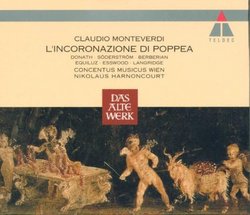| All Artists: Claudio Monteverdi, Concentus Musicus Wien, Nikolaus Harnoncourt, Paul Esswood, Janet Perry, Matti Salminen, Alexander Oliver, Helen Donath, Cathy Berberian, Philip Langridge, Carlo Gaifa, Enrico Fissore, Rotraud Hansmann, Jane Gartner Title: Monteverdi: L'Incoronazione di Poppea Members Wishing: 0 Total Copies: 0 Label: Teldec Release Date: 6/8/1993 Genre: Classical Styles: Opera & Classical Vocal, Historical Periods, Baroque (c.1600-1750) Number of Discs: 4 SwapaCD Credits: 4 UPCs: 022924254727, 022924254727 |
Search - Claudio Monteverdi, Concentus Musicus Wien, Nikolaus Harnoncourt :: Monteverdi: L'Incoronazione di Poppea
 | Claudio Monteverdi, Concentus Musicus Wien, Nikolaus Harnoncourt Monteverdi: L'Incoronazione di Poppea Genre: Classical |
Larger Image |
CD Details |
CD ReviewsMonteverdi Interpreted by the Best! Harpsichord Fan | 06/11/2000 (5 out of 5 stars) "There is nothing about this recording that is not excellent. Let me start with the conductor, Mr. Nicholas Harnoncourt. Kudos for this amazing period rendition of this eternal operatic masterpiece. The orchestra is unarguably made of some of the best period instrument performers in Europe; they don't just accompany the singers, they are part of the opera! The liner notes and libretto are quite impressive as well.Elisabeth Soderstrom is the best Nerone I have heard -- she is off-the-wall and slightly frantic as Nerone should be, but she really gives off the impression of an immature young man. The rest of the cast is quite excellent as well, especially Poppea and Eswood, who plays Ottone; however, the Italian who sings Seneca is a bit too austere at times. Nevertheless, make sure that this is a part of your CD collection. Just sit down one day and listen through once with the libretto. You'll never be same afterwards, trust me. I do have one objection, however. It's become more apparent, in the last few years, that Harnoncourt's "period" interpretation was misplaced. Thanks to the efforts of such people as Alan Curtis, we are beginning to see the Monteverdi opera scores as complete scores rather than things that need "filling out." Therefore, Harnoncourt's full baroque orchestral arrangement is somewhat problematic and actually quite inauthentic - funny how it seems like the old d'Indy and Benvenuti arrangements now. However, the singers are fabulous, so that shouldn't keep you from getting this recording." I'd try another Poppea FrKurt Messick | 05/02/2001 (2 out of 5 stars) "This is a classic recording, and it's still the one used in college music history courses. Too bad. Harnoncourt's version of "historically informed" period practice is the style of the 1960s, and that matters: the performance is stiff and unsubtle. The grand parts are simply loud and forceful, not eloquent. I would never fall in love with this opera based on this recording, the way I did when I heard Rene Jacobs' recording (Harmonia Mundi France #901330), which is much more sensuous and lyrical than Harnoncourt's and makes the love story of this opera sound like one. Or if you want more dramatic pacing, try John Eliot Gardiner." Monteverdi's last, great opera FrKurt Messick | Bloomington, IN USA | 10/14/2005 (5 out of 5 stars) "If Monteverdi is considered the father of opera (his work 'L'Orfeo' is considered by many to be the first opera), then this is the crowning achievement of his operatic composition career. 'The Coronation of Poppea' draws not on sacred themes nor on mythological themes, but rather on historical events - Poppea was the wife of the emperor Nero,
Monteverdi and Busenello casts Poppea as a heroine, drawing her story from the Annals of Tacitus. There is a mythic overlay, as the characters of Love, Virtue and Fortune are personified, and in the end Love wins out over all (this draws on the mythological story 'The Judgement of Paris', in which three goddesses sought out an impartial judge, and Paris ruled in favour of love, setting off a course of events that would lead to the Trojan War). There is quite a mess of love affairs, cheatings, and courtships in the story, as befit the scene in ancient Rome. The irony is that the climax seems to be the coronation of Poppea as Empress, having displaced the previous Empress and having left her husband Ottone for that of the emperor, whereas in history (a history the audience would know) Poppea then ends up being murdered by Nero, and Ottone/Otho ends up as emperor after all (albeit very briefly, being one of the four in the 'year of four emperors'). Ottone is often played as a baritone, but the original calls for an alto. Nero/Nerone was a role for a castrato soprano, now often cast for performance by a tenor or mezzo-soprano. There is quite a reversal of things here, as Poppea's nurse is usually played lower, often by a tenor. The instrumentation of this performance strives for historical accuracy. 'Various continuo instruments, harpsichord, virginal, chitarrone, lute, organ and harp were in part assigned to certain figures, and partly also to definite dramatic effects, so that at the same time the dialogue sees a change in the continuo sound.' The composition survives in notes and singing parts only for the most part, in which much reconstruction has had to take place. Harnoncourt and his ensemble, the Concentus musicus Wien, have done a very good job at drawing together a fuller feel, but as another reviewer has commented, modern ideas are that Monteverdi intentionally left the composition more spare, and the more-Baroque sound of Harnoncourt, however beautiful, is in fact less faithful to the original than once thought. Helen Donath and Elisabeth Soderstrom are perfect for their roles as Poppea and Nerone; the role of Seneca is performed by Giancarlo Luccardi, who gives a good, forceful and meaningful voice to this important role. This was originally recorded and released on vinyl by Teldec in 1974, and it is wonderful to have it available on CD. The transfer has been done with very high production value, and no discernable degradation of sound. " |
